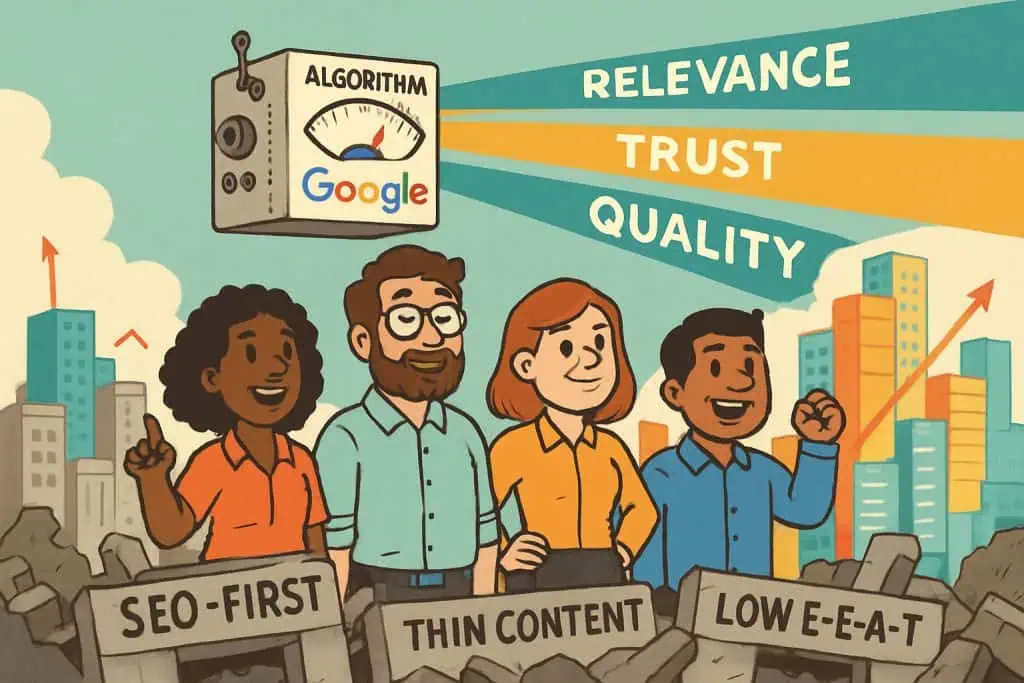Summary
The Google March 2025 Core Update (March 13–27) reset ranking signals across sectors like health, news, and affiliate publishing, penalizing thin or SEO-first content while rebalancing forums and UGC toward intent-fit value. Winners demonstrated E-E-A-T, fresh and comprehensive coverage, clear authorship and sourcing, strong UX, and authentic user discussion aligned with search intent. Recovery focuses on auditing or pruning outdated pages, strengthening trust markers, matching query intent, improving technical performance, monitoring in Search Console, and building resilience with first-party data and careful AI use.
Waking up to see rankings tumble can feel brutal. Many websites saw that exact scenario after the Google March 2025 Core Update. This change wasn’t small. It was a complete reset of Google’s content and authority standards, shaking industries across the board.
The Core Update rolled out between March 13 and March 27, bringing volatility similar to past broad core updates, but with sharper shifts in sectors such as health, news, and affiliate publishing. Unlike a narrow tweak, the Google March 2025 Core Update affected almost every site, regardless of niche.
Biggest shifts:
- Content quality became non-negotiable. Thin, outdated, or shallow articles sank fast.
- Forums and UGC platforms were rebalanced. After years of pushing “hidden gems,” the Core Update reduced visibility for many forum-driven sites.
- Pages built with “SEO-first” tricks rather than genuine usefulness lost trust.
In short, the Google March 2025 Core Update rewards real value and punishes shortcuts.
Affiliate publishers saw some of the sharpest declines, with traffic down by 50–70%. Healthcare and education sites were shaken, too, while news outlets experienced constant swings during the rollout of the Google March 2025 Core Update. Sites that hadn’t refreshed content in years were hit hardest.
Yet some platforms gained. Reddit and a few other community-driven spaces benefited, demonstrating that the Google March 2025 Core Update continues to reflect demand for authentic user discussion when it aligns with Search intent.
SEO Survival After
The Google March 2025 Core Update makes clear that recovery requires more than keyword stuffing or link chasing. It’s about building credibility and providing genuine help.
Key survival moves:
- Audit old posts. If they don’t serve a user need, either upgrade them or remove them. The Google March 2025 Core Update punishes clutter.
- Strengthen E-E-A-T signals. Author bios, expert input, and transparent sourcing are essential post-Google March 2025 Core Update.
- Match intent, not just phrases. Pages must solve the real query behind the keyword to win.
- Improve UX. Fast loading, mobile readiness, and logical structure are table stakes.
Monitoring the Google March 2025 Core Update Effects
Tracking performance is critical. Use Search Console to see which queries lost traction during the Google March 2025 Core Update. Compare winners in your niche. Many gained because their content featured fresher updates, deeper coverage, or stronger trust signals.
The Google March 2025 Core Update isn’t something to “fix” in one sprint. SEO now requires ongoing cycles of improvement, constant updates to cornerstone pieces, and a willingness to scrap content that drags down trust.
No one escapes change. The Google March 2025 Core Update is another reminder that shortcuts don’t last. Those who adapt with stronger expertise, sharper accuracy, and content that actually serves users will come out ahead.
Recovery and Future-Proofing
- Embrace E-E-A-T: Make expertise, experience, authority, and trust the foundation of your content strategy.
- Prioritise User Satisfaction: Optimise for real engagement metrics-time on site, bounce rate, and user feedback now influence rankings more than ever.
- Invest in First-Party Data: As third-party cookies fade, use lead magnets and interactive tools to collect and leverage your audience’s insights.
- Leverage AI Tools Responsibly: Use AI for research and ideation, but always add a human. Google’s algorithms can now distinguish between generic and genuinely insightful content.
- Prepare for Ongoing Volatility: Google core updates are becoming more frequent. Build agility into your SEO processes and be ready to adapt as new updates roll out.
Turning Algorithm Volatility Into Opportunity
The recent core update represents a structural shift in how Search engines evaluate authority and relevance. It is not a one-off adjustment but part of a longer trend: rewarding verifiable expertise, demonstrated experience, and genuine signals of trust over mechanical SEO tactics. Websites that relied heavily on keyword density, thin affiliate content, or outdated backlink strategies experienced sharp declines because these approaches no longer align with how ranking systems define value.
At the same time, winners in this update reveal the blueprint for resilience. Sites that invested in subject-matter experts, transparent authorship, and thorough editorial processes saw their visibility increase in healthcare, education, and finance, where accuracy and trust are critical. Pages backed by qualified professionals outperformed those without clear attribution. This illustrates how algorithmic priorities are moving closer to human judgment: if a reader questions credibility, the system will, too.
User experience has also become inseparable from rankings. Engagement metrics such as dwell time, task completion, and repeat visits are strong indicators of satisfaction. A well-structured page that loads quickly on mobile, provides multimedia support, and guides the reader smoothly through information will naturally accumulate positive engagement signals. In contrast, even high-quality text buried in a poor interface can now underperform. The update reinforces the idea that technical SEO and content strategy cannot be siloed; they must work in unison.
Another defining factor is freshness and adaptability. Information that stagnates loses ground as the system prioritises up-to-date, contextually relevant resources. This means content maintenance is no longer optional; regular revisions, expansions, and fact-checks are part of an ongoing survival plan. Agility has become a competitive advantage, enabling publishers to respond rapidly to shifts.
Finally, this update signals the decline of one-size-fits-all optimisation. The ranking system is increasingly granular, differentiating between intent types and rewarding context-specific solutions. A tutorial page, a product review, and a news article will not be measured using the same yardstick. To stay visible, publishers must not only understand their audience but also align the form and depth of their content with the intent behind the query.
Taken together, these changes redefine what it means to be “future-proof.” The pathway forward is less about reacting to algorithmic swings and more about embedding principles of credibility, usability, and adaptability into the site’s foundation. Those who view updates not as disruptions but as recalibrations of quality will find themselves less vulnerable to sudden drops and better positioned for sustained growth.
Sources
-
- https://searchengineland.com/google-march-2025-core-update-rollout-is-now-complete-453364
- https://www.journaldunet.com/seo/1540485-google-core-update-mars-2025-est-termine-faisons-le-point/
- https://www.linkedin.com/pulse/google-march-2025-core-update-comprehensive-guide-iugef
- https://www.ncbi.nlm.nih.gov/pmc/articles/PMC11956392/
- https://www.seoptimer.com/blog/google-march-2025-core-update/
- https://www.linkedin.com/pulse/google-march-2025-core-update-comprehensive-guide-iugef
- https://www.campaigndigital.com.au/articles/googles-algorithm-in-2025-what-you-need-to-know
- https://wsiinternetpartners.com/googles-march-2025-core-update-a-guide-for-website-owners/
- https://digitalfreak.com.au/what-to-do-google-march-2025-core-seo-update/
- https://campaignme.com/navigating-googles-march-2025-algorithm-updates/
- https://scaledon.com/googles-new-core-update-is-shaking-up-rankings-heres-what-you-need-to-do-now/
- https://www.youtube.com/watch?v=VV1ql_BwD7o
- https://digitalconfex.com/google-algorithm-updates-2025-seo-trends/
- https://www.seroundtable.com/google-march-2025-core-update-done-39142.html
- https://moversdev.com/google-algorithm-changes-in-2025-what-movers-need-to-know/
Q&A
Q: What did the Google March 2025 Core Update change about content rankings?
A: I prioritised genuine usefulness, freshness, and E-E-A-T while devaluing thin, outdated, and SEO-first pages.
Q: Which sites were most affected by the March 2025 core update volatility?
A: Affiliate publishers saw steep drops, with turbulence also in health, education, and news verticals.
Q: How do sites recover post Google March 2025 Core Update?
A: Audit and upgrade or remove weak content, fortify authorship and sourcing, align to Search intent, and fix UX speed and structure.
Q: What ongoing SEO practices help future-proof against core updates?
A: Maintain continuous content refresh, track losers and winners in Search Console, invest in first-party data, and use AI responsibly with human oversight.





